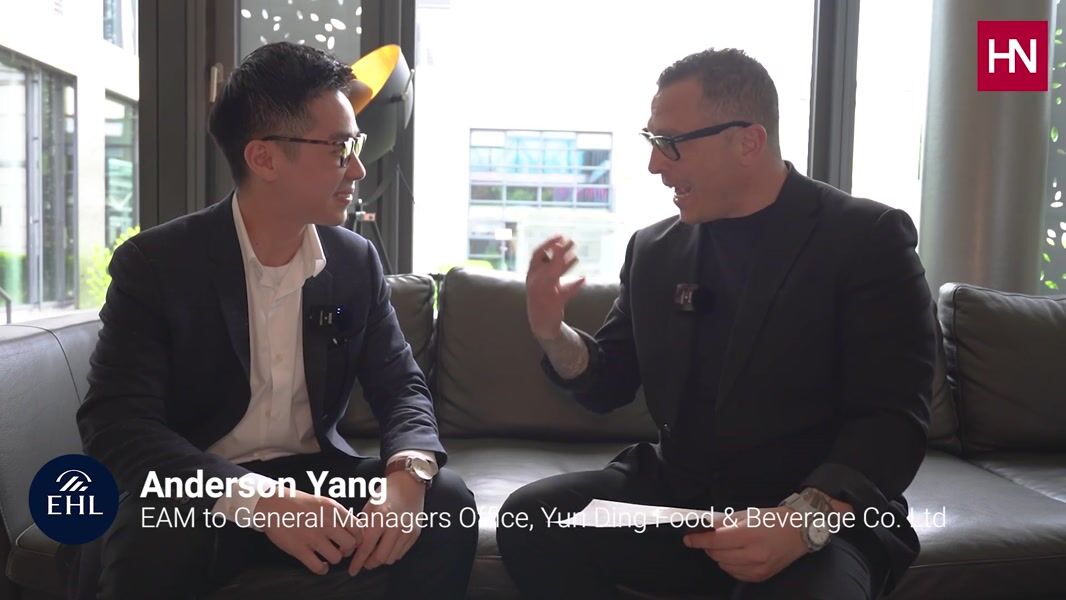
At the EHL Open Innovation Summit in Lausanne, we spoke with Anderson Yang, EAM to the General Manager’s Office at Yun Ding Food & Beverage Co. Ltd, about how artificial intelligence is shaping the future of hospitality, how innovation can thrive when rooted in tradition, and why building genuine community through storytelling is more powerful than conventional marketing in today’s evolving landscape.
Which technology or innovation do you believe will most reshape the hospitality industry over the next 5 to 10 years?
It is without a doubt artificial intelligence. The way AI is expanding so quickly is going to take a lot of leverage into the hospitality market. It will create new ways of experiences and really allow for different customizations across client markets.
How can you still innovate without losing your cultural roots?
As a third-generation family business, heritage is very important, but it should be a foundation, not a ceiling. It has to be seen as a springboard. Innovation must come from building on our legacy, not being limited by it. All the market and product know-how adds up to something, but it cannot be the framework that restricts us. It must be something we transform and innovate from.
You said before that innovation is not the thing that is very hard. What is really hard is creating the environment. Can you elaborate on that?
Ten years ago, innovation itself was high value. Now we are shifting into an era where ideas are no longer unique. AI generates ideas in seconds. What matters now is creating an environment that can hold and support that innovation. That environment comes down to three things: people, place, and power. People means the people closest to the market, closest to the product, and closest to the customer. Place is the working environment where ideas can flow. Power is the hardest to talk about, especially in a family business, but it is about rewiring how we think. Instead of a top-down hierarchical structure, power must be decentralized. It is about letting the relevant people decide, especially those on the ground. They are the ones driving innovation. Anderson emphasized that in his context in Taiwan, people are often afraid to bring new ideas forward. Business leaders must encourage failure and make it safe for people to speak up.
You talked about your approach to launching a new juice brand and how you avoided hard marketing. Why is that, and how do you see the role of community?
They created a natural, functional juice brand, and instead of using hard marketing or guerilla tactics, they focused on sharing their story. It was not about pushing a product into people’s faces. It was about telling the story behind it, finding people who believed in the mission, and letting the community represent the product. The product supports energy, metabolism, and detox. They did their homework and let people try it. The power of community is stronger than traditional marketing. In an artificial world where AI can write a business plan in five minutes, what will stand out is authenticity. Storytelling is key. Let people know why you started, what you believe in, and they will connect with it emotionally.
About the EHL Open Innovation Summit 2025
This interview was recorded during the EHL Open Innovation Summit in Lausanne, where Hospitality Net joined as official media partner.
The event brought together a global mix of thinkers and doers to explore the future of hospitality, food, and travel through open innovation. What made it special was the mix of ideas, formats, and people. It was not only about tech or talks. It was also about people showing up, working together, and sharing energy in real time.
Key Figures
- 385 participants
- 48 speakers and contributors from more than 20 countries
- 7 innovation challenges collectively addressed
- 45 sessions
- 25 student volunteers
- 15 F&B startups letting us taste the future
- 1.5 days of connection, learning, and co-creation
Key Insights from the Summit
- A new benchmark for hospitality innovation
The summit set a new standard by weaving together AI, sustainability, regeneration, and human connection – showing that innovation in hospitality, luxury and food must be holistic, human-centric, and purpose-driven. Participants repeatedly highlighted the need to go beyond efficiency and into meaningful transformation. - From knowledge exchange to real-time co-creation
More than just a series of talks, the summit was an activation space – a living lab where diverse minds worked together on pressing challenges, from regenerative tourism to circular luxury to AI in guest experience. It was a showcase of collective intelligence in motion. - Collaboration as the engine of systems change
Open Innovation came alive not as a buzzword, but as a relational practice. From panelists to students, from global explorers to startup founders, everyone was invited to co-create, connect dots, and contribute. Participants repeatedly said they experienced true collaboration across boundaries, industry, sector, age, and background. - The power of presence: hearts, minds, and hands
Whether walking in the forest, painting together, or debating future systems, attendees embraced the idea that innovation isn’t only about tech and metrics – it’s also about embodied experience, slowing down to speed up, and nurturing a regenerative mindset. - The future is “AND” – not “either/or”
A recurring takeaway: we must stop choosing between extremes. The future is tech AND human, healthy AND delicious, profitable AND impactful. This “integration mindset” is already informing how leaders, startups, and educators present are reshaping their strategies. - The beginning of a long-term movement
Attendees described the summit as the start of something much bigger – a platform for experimentation, learning, and alliance-building. The EHL Innovation Hub was recognized not only as an academic powerhouse, but as a true catalyst for regenerative innovation across hospitality, service, food, and travel.
Please visit:
Our Sponsor
